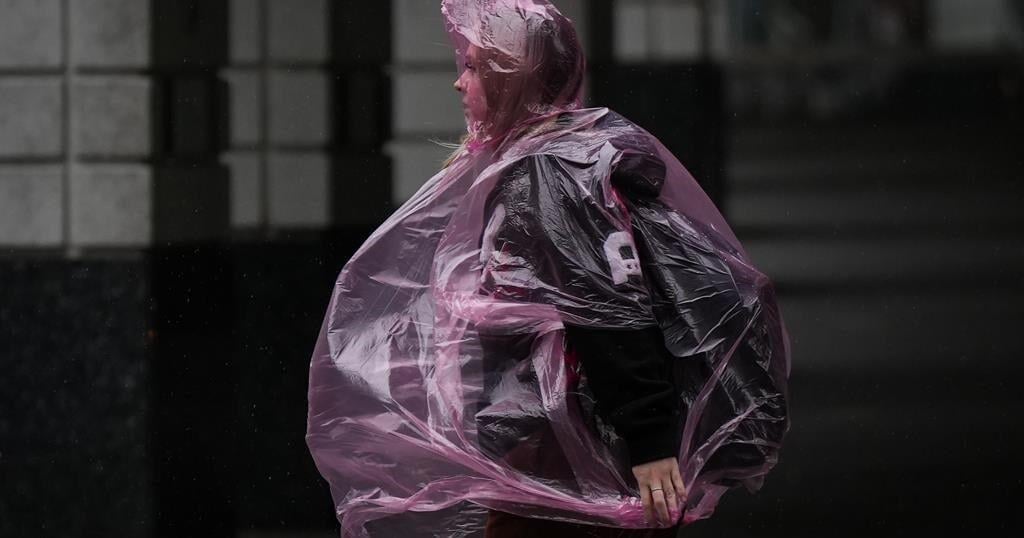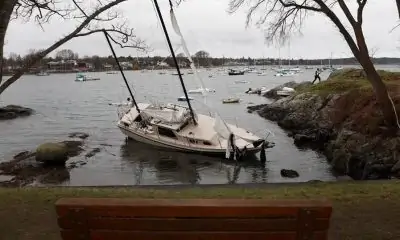VANCOUVER – The use of terms including “atmospheric rivers” and “bomb cyclones” to describe weather phenomena has moved out of scientific journals and into the mainstream in recent years, but meteorologist Cindy Day says there’s nothing alarmist about the language.
Day said that when used appropriately, such scientific language was necessary and could help people better prepare for the impact of extreme weather events.
Her comments came as Environment Canada warned much of coastal and interior British Columbia to brace for intense winds brought by a bomb cyclone, a non-tropical storm system caused by a rapid drop in atmospheric pressure at its centre.
Environment Canada said it could bring gusts of 120 km/h to the central and north coasts, with winds of 100 km/h or more elsewhere on the coast and Vancouver Island.
It said the winds were expected to peak Tuesday night with severe weather likely to continue into Wednesday.
“Some areas can also expect heavy rain at times during this event, but winds will remain the primary concern,” it said, also warning people about possible damage to buildings, fallen trees and hazardous driving conditions.
Day said the term “bomb cyclone” had been used by scientists for decades to describe “a low-pressure system that is undergoing explosive cyclogenesis,” or the creation of cyclonic air circulation.
She said terms like “bomb cyclone” and “atmospheric river” could often help paint a picture that allowed people to better understand and prepare for various weather systems.
In British Columbia, an atmospheric river originating near Hawaii has long been known as a “pineapple express.”
“So, an atmospheric river — right away, people start to think, ‘OK, it’s a narrow band of moving water,'” Day said.
“It does give you the sense that this is going to be a steady event and that there’s not going to be time for the ground to absorb the rain. It’ll continue to rain and eventually cause flooding because of that concentrated rainfall.”
In British Columbia, the government called for the creation of a scale to rank the power of atmospheric river events in 2021, in the wake of a devastating system that brought widespread flooding and shut down the Trans-Canada Highway and other key roads.
But Environment Canada said the next year that implementing such a scale for public warnings was premature.
Day noted that she had received “a lot of grief” for using the term “bomb” in relation to meteorological phenomena, with some accusing her of trying to sensationalize weather events.
“I really believe that if they’re used in the proper context, that they’re not alarmist,” she said.
“As long as the people know that they’re getting their information from a qualified source, and that source (or) that person is using the terms correctly and not shouting out ‘bomb’ every time there’s an area of rain coming in, I think it’s really important to understand those words and to take them seriously and to know that they’re based in meteorological fact, in science.”
By Tuesday morning, Environment Canada had issued almost 40 wind warnings and special weather statements covering Vancouver Island, mainland coastal sections of B.C. and extending into the Interior, ahead of the anticipated bomb cyclone.
Those advisories came after much of Metro Vancouver saw its first snowfall of the season Monday night.
The province said in a statement Tuesday morning that the Ministry of Emergency Management would work closely with communities to ensure preparedness and that the River Forecast Centre was monitoring weather patterns and river conditions.
It said the transportation ministry would also have maintenance contractors watching conditions so crews can respond quickly to flooding or debris buildup.
BC Ferries cancelled numerous sailings for later Tuesday between the Lower Mainland and Vancouver Island, including ships leaving from Tsawwassen, Horseshoe Bay, Swarts Bay and Nanaimo, citing a “deteriorating weather forecast for high winds in the Strait of Georgia.”
Sailings for the late afternoon or evening service on Tuesday have also been cancelled between Metro Vancouver and the Sunshine Coast, Vancouver Island and the northern Gulf Island.
The agency doesn’t say when service might resume.
This report by The Canadian Press was first published Nov. 19, 2024.

























